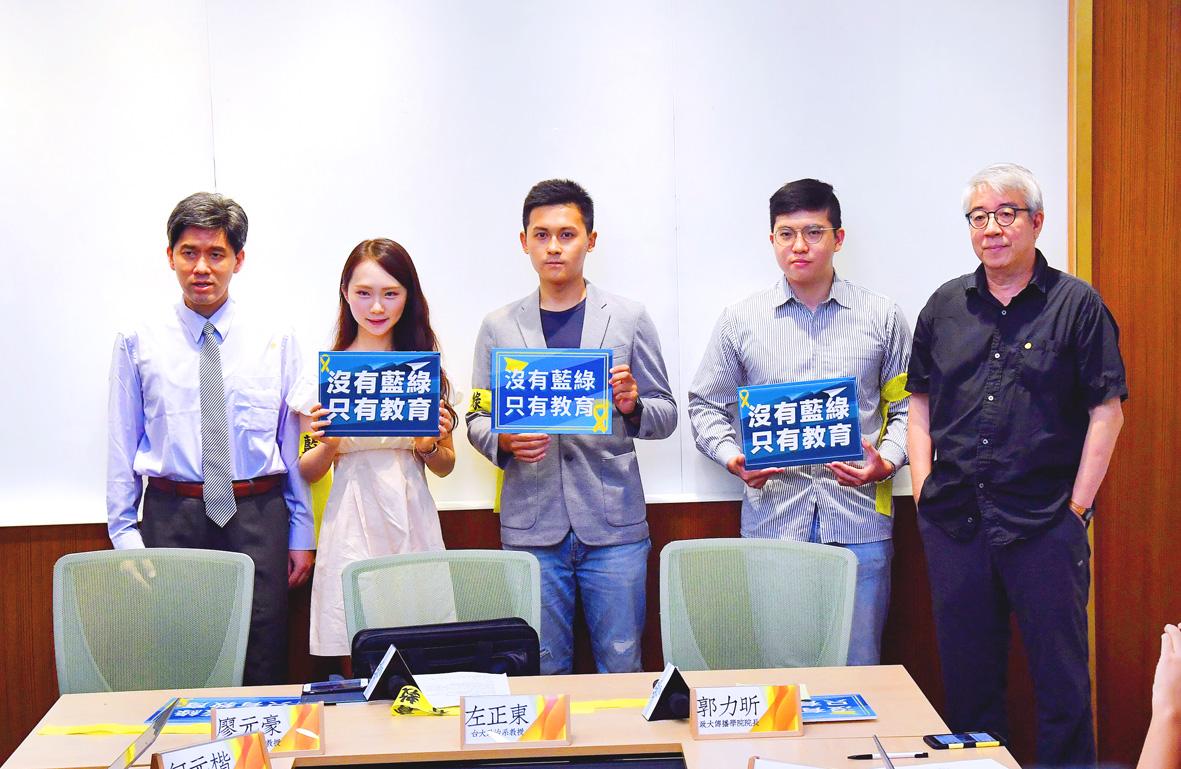Representatives of student groups as well as university professors yesterday called on the government to allow all Chinese students to return to Taiwan.
The Ministry of Education on Wednesday last week announced that it would allow all foreign students enrolled in college degree programs to return to Taiwan to continue their studies.
However, later that day the ministry said that some Chinese students would not be included.

Photo: CNA
Deputy Minister of Education Lio Mon-chi (劉孟奇) said that due to “cross-strait related considerations,” only Chinese students in their final year would be allowed to return.
At a news conference in Taipei yesterday, members of the Chinese Youth Public Participation Association and the Taiwan Student Rights Front, and several professors protested the exclusion of Chinese students who are not in their final year.
“No blue [or] green, only education,” they shouted while holding signs with the same message.
The government should explain whether the exclusion of some Chinese students was due to political or disease-prevention considerations, said Ho Yuan-kai (何元楷), a graduate student at National Chengchi University (NCCU) and a founder of the Taiwan Student Rights Front, an advocacy group comprised of students from NCCU, National Taiwan University (NTU), National Taipei University and other institutes that focuses on education policy and public affairs.
The government should propose disease-prevention measures for foreign students returning to Taiwan to study, instead of sacrificing the rights of Chinese students, Ho said.
The ministry and the Mainland Affairs Council should discuss a way to enable foreign students, including from China, to return to Taiwan this semester, he said.
Huang Ling-hsuan (黃翎軒), another Taiwan Student Rights Front founder and a student at NTU, called the central government’s policy for the entry of Chinese students “discriminatory.”
The same standards that apply to students from other foreign countries should apply to Chinese students, Huang said.
Chinese Youth Public Participation Association deputy secretary-general Chen Ho-hsu (陳賀煦) said that distance learning via videoconferencing has made it difficult for Chinese students to participate in classroom discussions that other students are able to attend in person.
Chinese students pay the same tuition as others, but are currently unable to access physical resources such as libraries, Chen said.
NCCU College of Communication dean Kuo Li-hsin (郭力昕) said that political factors were the “only reason” behind the Democratic Progressive Party administration’s prevention of some Chinese students from returning to Taiwan.
NCCU professor of law Liao Yuan-hao (廖元豪) and NTU professor of political science Tso Chen-dong (左正東) also attended the news conference to support allowing all Chinese students to return.
Earlier yesterday, former president Ma Ying-jeou (馬英九) called the exclusion of Chinese students from the government’s policy allowing foreign students to return “deeply disappointing.”
In a Facebook post, Ma urged university presidents to protest the policy and demand that President Tsai Ing-wen’s (蔡英文) administration correct it.
Meanwhile, children in China aged two to six who have one Taiwanese parent and one Chinese parent, and have Taiwanese residency, from yesterday were eligible to enter Taiwan, the Central Epidemic Command Center said on Wednesday.
Additional reporting by CNA

A year-long renovation of Taipei’s Bangka Park (艋舺公園) began yesterday, as city workers fenced off the site and cleared out belongings left by homeless residents who had been living there. Despite protests from displaced residents, a city official defended the government’s relocation efforts, saying transitional housing has been offered. The renovation of the park in Taipei’s Wanhua District (萬華), near Longshan Temple (龍山寺), began at 9am yesterday, as about 20 homeless people packed their belongings and left after being asked to move by city personnel. Among them was a 90-year-old woman surnamed Wang (王), who last week said that she had no plans

China might accelerate its strategic actions toward Taiwan, the South China Sea and across the first island chain, after the US officially entered a military conflict with Iran, as Beijing would perceive Washington as incapable of fighting a two-front war, a military expert said yesterday. The US’ ongoing conflict with Iran is not merely an act of retaliation or a “delaying tactic,” but a strategic military campaign aimed at dismantling Tehran’s nuclear capabilities and reshaping the regional order in the Middle East, said National Defense University distinguished adjunct lecturer Holmes Liao (廖宏祥), former McDonnell Douglas Aerospace representative in Taiwan. If

TO BE APPEALED: The environment ministry said coal reduction goals had to be reached within two months, which was against the principle of legitimate expectation The Taipei High Administrative Court on Thursday ruled in favor of the Taichung Environmental Protection Bureau in its administrative litigation against the Ministry of Environment for the rescission of a NT$18 million fine (US$609,570) imposed by the bureau on the Taichung Power Plant in 2019 for alleged excess coal power generation. The bureau in November 2019 revised what it said was a “slip of the pen” in the text of the operating permit granted to the plant — which is run by Taiwan Power Co (Taipower) — in October 2017. The permit originally read: “reduce coal use by 40 percent from Jan.

‘SPEY’ REACTION: Beijing said its Eastern Theater Command ‘organized troops to monitor and guard the entire process’ of a Taiwan Strait transit China sent 74 warplanes toward Taiwan between late Thursday and early yesterday, 61 of which crossed the median line in the Taiwan Strait. It was not clear why so many planes were scrambled, said the Ministry of National Defense, which tabulated the flights. The aircraft were sent in two separate tranches, the ministry said. The Ministry of Foreign Affairs on Thursday “confirmed and welcomed” a transit by the British Royal Navy’s HMS Spey, a River-class offshore patrol vessel, through the Taiwan Strait a day earlier. The ship’s transit “once again [reaffirmed the Strait’s] status as international waters,” the foreign ministry said. “Such transits by